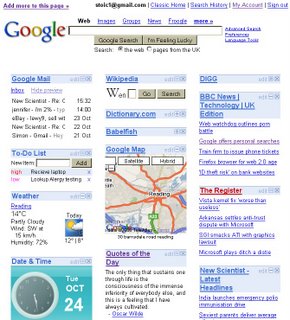Then this BBC article pointed me to an even more significant development: customised Google Search. Provided i can login easily on remote machines this could be particularly handy, as it incorporates a whole shed load of customizable content: GMail inbox, to-do lists, local weather, RSS news feeds from my favourite sites + quick search boxes for Wikipedia and so on.... I've not even made any new searches to test out main feature of this new service!
At first glance this service appears altruistically helpful, though i'm sure the profit will continue to pour in as usual back at Google headquarters. I'd guess the service is mostly to encourage use of the custom search facilities that will allow higher paying, even more directed ads. However, Google’s expansionist efforts have been touted as being far less successful than it's root interest. Add to this the much squawked about $1.6B for YouTube, that seems a little puzzling in itself (given the potential copyright issues), and it looks a little like the big G's vying for a monopoly on the worlds information! (though this is Google’s first big purchase, and take-overs have been rife in big business for ages. Any hot new company with a new hold on a service gets snapped up, probably by a bigger fish that came to popularity in a previous wave of success).
 Which brings me to an article by George Dyson (Son of physicist/intellectual/extraordinaire Freeman Dyson, whose books have been a big influence for me) on the Edge that i've been meaning to blog for a little while:
Which brings me to an article by George Dyson (Son of physicist/intellectual/extraordinaire Freeman Dyson, whose books have been a big influence for me) on the Edge that i've been meaning to blog for a little while:TURING'S CATHEDRAL (by George Dyson):
The main meme of the feature is speculation on the possibility of strong A.I. having been created and already existing in some form within the Google computer equipment. Naturally this sounds entirely fanciful at first, given that the limited power of computers, for the moment, inhibits the simulating/emulating anything nearly as complicated as a human brain. Then again, if anywhere was able to support a true A.I. it would be within those estimated 450,000 servers spread around the world potentially using some of the masses of dark fibre bandwidth it wanted to/did purchase some time ago (Link 1 | 2).
Here are a selection of quotes from the article (higlighted in red) that i think are enlightening, starting with a little mitigation against those who may think creating artificial consiousness would be as good as trying to steal God's powers:
Alan Turing - Computing Machinery and Intelligence: "In attempting to construct such machines we should not be irreverently usurping His power of creating souls, any more than we are in the procreation of children...Rather we are, in either case, instruments of His will providing mansions for the souls that He creates."
Google Employee: "We are not scanning all those books to be read by people," explained one of my hosts after my talk. "We are scanning them to be read by an AI."
A pretty direct statement! One that does make me excited like the little child that i am. Of course, having that vast amount of accumulated information is one thing, processing and 'understanding' it is another! Then there's the question: in what way is this potential intelligence observable? What capabilities will it control? Mearly a textual input/output on a secret terminal screen somewhere?
H. G. Wells - World Brain (1938 ); "The whole human memory can be, and probably in a short time will be, made accessible to every individual...This new all-human cerebrum need not be concentrated in any one single place. It can be reproduced exactly and fully, in Peru, China, Iceland, Central Africa, or wherever else seems to afford an insurance against danger and interruption. It can have at once, the concentration of a craniate animal and the diffused vitality of an amoeba."
Google is perhaps already doing a fair approximation of a 'world brain', even bowing to censorship demands to ensure it's pressence in china. A search engine accessible by practically the globe in any language, that can understand and answer all requests is almost explicitly the goal of Google, so it seems, and is almost exactly the description of a 'Hub/orbital/rock mind' from Ian M Banks. Read "Look to Windward" for a detailed description of a hub mind within a brilliant story!
I'm going to finish on this thought provoking note:
Anomalous accumulation or creation of wealth might be a sign, or an unquenchable thirst for raw information, storage space, and processing cycles, or a concerted attempt to secure an uninterrupted, autonomous power supply. But the real sign, I suspect, would be a circle of cheerful, contented, intellectually and physically well-nourished people surrounding the AI.


No comments:
Post a Comment
I'm very happy to see comments, but I need to filter out spam. :-)